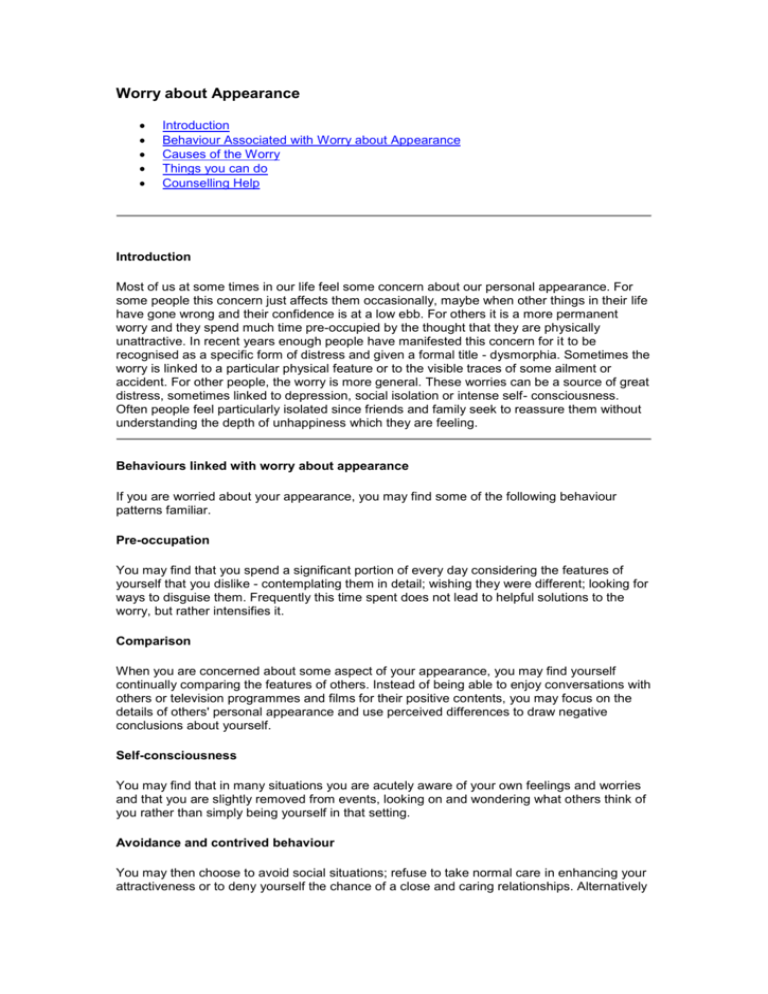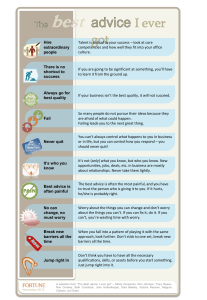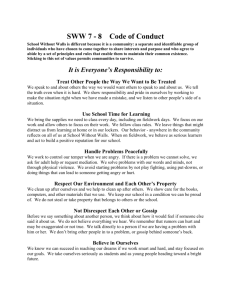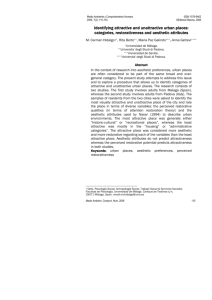Behaviours linked with worry about appearance
advertisement

Worry about Appearance Introduction Behaviour Associated with Worry about Appearance Causes of the Worry Things you can do Counselling Help Introduction Most of us at some times in our life feel some concern about our personal appearance. For some people this concern just affects them occasionally, maybe when other things in their life have gone wrong and their confidence is at a low ebb. For others it is a more permanent worry and they spend much time pre-occupied by the thought that they are physically unattractive. In recent years enough people have manifested this concern for it to be recognised as a specific form of distress and given a formal title - dysmorphia. Sometimes the worry is linked to a particular physical feature or to the visible traces of some ailment or accident. For other people, the worry is more general. These worries can be a source of great distress, sometimes linked to depression, social isolation or intense self- consciousness. Often people feel particularly isolated since friends and family seek to reassure them without understanding the depth of unhappiness which they are feeling. Behaviours linked with worry about appearance If you are worried about your appearance, you may find some of the following behaviour patterns familiar. Pre-occupation You may find that you spend a significant portion of every day considering the features of yourself that you dislike - contemplating them in detail; wishing they were different; looking for ways to disguise them. Frequently this time spent does not lead to helpful solutions to the worry, but rather intensifies it. Comparison When you are concerned about some aspect of your appearance, you may find yourself continually comparing the features of others. Instead of being able to enjoy conversations with others or television programmes and films for their positive contents, you may focus on the details of others' personal appearance and use perceived differences to draw negative conclusions about yourself. Self-consciousness You may find that in many situations you are acutely aware of your own feelings and worries and that you are slightly removed from events, looking on and wondering what others think of you rather than simply being yourself in that setting. Avoidance and contrived behaviour You may then choose to avoid social situations; refuse to take normal care in enhancing your attractiveness or to deny yourself the chance of a close and caring relationships. Alternatively you may continue to mix with others, but may take great care to present yourself in a certain way, to wear particular clothes or adopt a certain role so that you avoid others' scrutiny. Hopelessness and Depression If you feel that you are not attractive to others, you may then find it hard to feel positive about the future. This may be linked to feelings of depression (tearfulness, disturbed sleep, unpredictable appetite, sense of low self-worth). Possible causes of unhappiness over appearance Some of the following factors may contribute to your unhappiness Our current overemphasis on appearance Society is probably more fixated on physical appearance at the moment than at any previous times. Great care is taken by all celebrities to ensure they look perfect when they are seen and to suppress all pictures of them looking less than ideal. The proliferation of these unreal images is thought to be linked with eating disorders and with many ordinary people's dissatisfaction with their own appearance. Our poor understanding of what constitutes attractiveness as opposed to beauty Defining why we find other people attractive is difficult. In long-term studies of happy couples, the qualities that people find attractive seem to include kindness and thoughtfulness, humour and carefreeness, shared interests and common goals. However these qualities are quite elusive and difficult to define, so there is a natural tendency to overestimate the importance of physical good looks which are more easily quantified and readily visible. Getting caught in the trap of depression People who are happy, carefree and spontaneous tend to be more attractive to others than those who are sad and preoccupied. They also look physically more attractive. Therefore a vicious circle can develop in which we become depressed because we decide we are unattractive; then we look less attractive because we are depressed. This is even more likely to be the case if being depressed means we are not taking care of ourselves. Not being able to get past first impressions One could argue that strikingly beautiful or handsome people do not have to find ways to meet people or start conversations, as they are more likely to be approached by others. Even if this is true, introductions are of course only the first part of a relationship, and once we meet someone our estimation of them usually changes. However, getting to know people is one of the harder parts of forming relationships and takes courage. If we have convinced ourselves that physical appearance is all that matters and that we are deficient in that area, we are less likely to get over the first hurdle. If it is any consolation, people who are strikingly attractive frequently report the opposite problem - that they feel intensely lonely because they find it hard to get people to take them seriously and to move beyond small talk and casual sex in order to enter into deeper relationships. Memories and associations If we have been mistreated, bullied or taunted in the past because of some aspect of our appearance, we can end up continuing to feel dissatisfied with ourselves rather than placing the blame where it really lies - with those who acted in such a cruel way. Similarly, aspects of our appearance can remind us of unhappy times. For example, if we have been through a long period of loneliness, we may well wear a habitually sorrowful or closed expression. If we then label ourselves as unattractive, we may then not give ourselves the chance of replacing the old unhappy experiences with new positive ones. Finally, family features - shape of nose, colour of hair - may bring to mind others in the family with whom we have had difficult relationships. Things that you can do Get to know yourself and your thought patterns better The first step in dealing with preoccupations is to make yourself aware of how precisely you tend to think. Are there times when you are particularly concerned about your appearance? Why might this be? Are there other times when you do not worry about it? Why does this happen? A bit of self- analysis in this way may help you to see a pattern. Create a break in the routine of preoccupation If there is a specific pattern, look for ways of modifying it. For example if you find you spend a lot of time studying yourself in the mirror when you wake up and so upset yourself, consider putting off looking in the mirror until you are dressed and ready to leave. Many people find it hard to decide what to wear in the morning. Choose your clothes the night before, and discipline yourself to put them on in the morning even if you feel less certain of your choice. If you find yourself comparing yourself with the famous and beautiful in films, challenge yourself to concentrate on the plot and how you would act in their place rather than on their appearance. Question your self-punishing thoughts We cannot change our thinking overnight. However, we can begin to stop summarily condemning ourselves without even giving ourselves a fair trial. When you are feeling negative about your appearance, practice listing the positive things about yourself and the perfectly good reasons why you may not be looking your best at that moment. Be creative in inventing as many virtues and excuses as you can. You may not immediately change your mind, but at least you will be beginning to be fair to yourself. Be kind to yourself and practice self-acceptance This is one of those things that is much easier to say than do. Many of us have developed an ingrained habit of self-reproach and are far less caring and accepting of ourselves than we are of our friends. You can however make a start. Try to spend up to fifteen minutes each day being kind to yourself. When you decide to do something to pamper yourself - whether it is listening to music, having a snack, relaxing in a bath, talking on the phone or whatever - do it wholeheartedly and undistractedly. It will probably feel uncomfortable and self-indulgent at first, but try and persist until it becomes a habit. Deal with depression If the symptoms of depression such as lethargy, hopelessness, tearfulness and self-reproach persist, do seek separate help. We have a leaflet on depression; both counselling and medication are possible and effective treatments. Counselling Anyone suffering from a preoccupation about themselves can experience great loneliness and unhappiness and can feel very trapped. Counselling will give you a chance to explore your worries in a friendly, supportive atmosphere and to consider ways of becoming more comfortable with you feelings. Contact the SCC by phone 343 - 4107 or by email) if you want to make an appointment.






